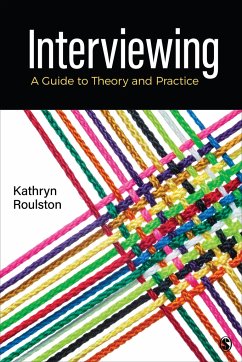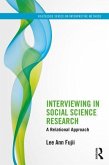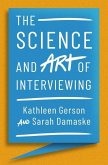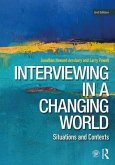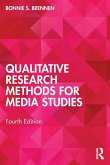- Broschiertes Buch
- Merkliste
- Auf die Merkliste
- Bewerten Bewerten
- Teilen
- Produkt teilen
- Produkterinnerung
- Produkterinnerung
Connecting "theory" and "method" can be challenging for novice researchers. Interviewing: A Guide to Theory and Practice draws from, and extends, the author¿s earlier 2010 book, and focuses on three interrelated issues, how researchers: theorize research interviews; examine their subject positions in relation to projects and participants; and explore the details of interview interaction to inform practice.
Andere Kunden interessierten sich auch für
![Interviewing in Social Science Research Interviewing in Social Science Research]() Lee Ann FujiiInterviewing in Social Science Research41,99 €
Lee Ann FujiiInterviewing in Social Science Research41,99 €![Science and Art of Interviewing Science and Art of Interviewing]() Kathleen Gerson (Professor of Sociology and Collegiate Professor ofScience and Art of Interviewing30,99 €
Kathleen Gerson (Professor of Sociology and Collegiate Professor ofScience and Art of Interviewing30,99 €![Motivational Interviewing for Working with Children and Families Motivational Interviewing for Working with Children and Families]() Donald ForresterMotivational Interviewing for Working with Children and Families40,99 €
Donald ForresterMotivational Interviewing for Working with Children and Families40,99 €![Investigative Interviewing Investigative Interviewing]() Investigative Interviewing63,99 €
Investigative Interviewing63,99 €![Communication and Interviewing Skills for Practice in Social Work, Counselling and the Health Professions Communication and Interviewing Skills for Practice in Social Work, Counselling and the Health Professions]() Patricia HighamCommunication and Interviewing Skills for Practice in Social Work, Counselling and the Health Professions53,99 €
Patricia HighamCommunication and Interviewing Skills for Practice in Social Work, Counselling and the Health Professions53,99 €![Interviewing in a Changing World Interviewing in a Changing World]() Jonathan H. AmsbaryInterviewing in a Changing World62,99 €
Jonathan H. AmsbaryInterviewing in a Changing World62,99 €![Qualitative Research Methods for Media Studies Qualitative Research Methods for Media Studies]() Bonnie S. Brennen (USA Marquette University)Qualitative Research Methods for Media Studies69,99 €
Bonnie S. Brennen (USA Marquette University)Qualitative Research Methods for Media Studies69,99 €-
-
-
Connecting "theory" and "method" can be challenging for novice researchers. Interviewing: A Guide to Theory and Practice draws from, and extends, the author¿s earlier 2010 book, and focuses on three interrelated issues, how researchers: theorize research interviews; examine their subject positions in relation to projects and participants; and explore the details of interview interaction to inform practice.
Hinweis: Dieser Artikel kann nur an eine deutsche Lieferadresse ausgeliefert werden.
Hinweis: Dieser Artikel kann nur an eine deutsche Lieferadresse ausgeliefert werden.
Produktdetails
- Produktdetails
- Verlag: SAGE Publications Inc
- Seitenzahl: 360
- Erscheinungstermin: 28. April 2022
- Englisch
- Abmessung: 152mm x 228mm x 24mm
- Gewicht: 522g
- ISBN-13: 9781071815717
- ISBN-10: 1071815717
- Artikelnr.: 62121883
- Herstellerkennzeichnung
- Libri GmbH
- Europaallee 1
- 36244 Bad Hersfeld
- gpsr@libri.de
- Verlag: SAGE Publications Inc
- Seitenzahl: 360
- Erscheinungstermin: 28. April 2022
- Englisch
- Abmessung: 152mm x 228mm x 24mm
- Gewicht: 522g
- ISBN-13: 9781071815717
- ISBN-10: 1071815717
- Artikelnr.: 62121883
- Herstellerkennzeichnung
- Libri GmbH
- Europaallee 1
- 36244 Bad Hersfeld
- gpsr@libri.de
Kathryn Roulston is a Professor in the Qualitative Research Program in the Mary Frances Early College of Education at the University of Georgia in Athens, Georgia, where she teaches qualitative research methods. Her research interests include qualitative research methods, qualitative interviewing, and analyses of talk-in-interaction. She is editor of Interactional Studies of Qualitative Interviews (2019), and with Kathleen deMarrais, has co-authored Exploring the Archives: A Beginner's Guide for Qualitative Researchers (forthcoming). She has contributed chapters to The SAGE Handbook of Interview Research (2012, 2nd edition), The SAGE Handbook of Qualitative Data Analysis (2014), The SAGE Handbook of Data Collection (2018), and the forthcoming volume, The SAGE Handbook of Qualitative Research Design. Her articles have been published in Qualitative Research, Qualitative Inquiry, International Journal of Social Research Methodology, International Journal of Qualitative Methods, and International Review of Qualitative Research among other journals.
Acknowledgments About the Author Introduction Background A Proposal for Advancing the Practice of Qualitative Interviewing Theories of Interviewing Theorizing the Researcher Examining the Construction of Interview Interaction Learning About Qualitative Interviewing Outline of the Book Chapter 1
Asking Questions and Individual Interviews Types of Interviews Questions and Answers Structure and Interview Talk Interviews Used in Qualitative Research Conclusion Further Reading Practice Chapter 2
Joint and Group Interviews Joint Interviews Formats for Working With Groups Focus Groups Designing a Study Using Focus Groups Developing Questions and Topic Guides Managing Focus Group Interaction Analyzing Focus Group Interaction Conclusion Further Reading Practice Chapter 3
Theorizing the Qualitative Interview A Neo-Positivist Conception of the Interview A Romantic Conception of the Interview A Constructionist Conception of the Interview A Postmodern Conception of the Interview A Transformative Conception of the Interview A Decolonizing Conception of the Interview Conclusion Further Reading Practice Chapter 4
Post Qualitative Inquiry and Interviewing Beyond Conventional Approaches to Inquiry Interviewing and Post Qualitative Inquiry What Issues Have Scholars Addressed? Implications of Post Qualitative Inquiry for Interview Research Conclusion Further Reading Practice Chapter 5
Designing Studies That Use Interviews Identifying a Topic Formulating Research Questions Using Research Interviews to Address Research Questions Selection and Sampling Demonstrating Quality in the Research Process Aligning Methods With Theoretical Assumptions Addressing Quality in a Neo-Positivist Conception of Interviewing Addressing Quality in a Romantic Conception of Interviewing Addressing Quality in a Constructionist Conception of Interviewing Addressing Quality in a Postmodern Conception of Interviewing Addressing Quality in a Transformative Conception of Interviewing Addressing Quality in a Decolonizing Conception of Interviewing Addressing Quality in Post Qualitative Inquiry Using Interviews Designing Research Studies Using Interviews Conclusion Further Reading Practice Chapter 6
Conducting Interview Research Consent for the Study Recruiting Participants Scheduling Interviews Other Modes of Communication for Interviews Special Populations Preparing to Interview Recording the Interview Conducting Interviews Working With Translated Data Transcribing Interviews Conclusion Further Reading Practice Chapter 7
Theorizing the Researcher: The Reflective Interviewer "Bias" and Research Reflexivity in Qualitative Research Beyond Reflexivity Subjectivity and Qualitative Research Subjectivity Statements Researcher Journals Interviewing the Researcher Analyzing the Interviewer's Work Conclusion Further Reading Practice Chapter 8
Examining the Construction of Interview Interaction Initial Principles Asking Questions of Transcriptions Epistemics and Interviewing Other Issues That Might Be Examined Conclusion Further Reading Practice Chapter 9
Analyzing and Representing Interview Data Qualitative Data Analysis and Reasoning Thematic Analysis Grounded Theory Approaches to Analysis Ethnographic Analysis Phenomenological Approaches to Analysis Approaches to the Analysis of Narrative Ethnomethodological Analysis Post Approaches to Analysis The Arts and Performative Approaches to Representation Conclusion Further Reading Practice Chapter 10
Accounts of Interviewing Practice Interviews With Interviewers What We Can Learn From Other Interviewers Qualitative Researchers' Accounts of Their Interview Practice Comparing Interviewing Outside the Academy to Interviewing for Academic Purposes Advice From Qualitative Interviewers Further Information Further Reading Practice Epilogue: Final Thoughts: Learning How to Interview Appendix 1. Transcription Conventions Appendix 2. Terms Used in Conversation Analysis Appendix 3. Teaching Resources References
Asking Questions and Individual Interviews Types of Interviews Questions and Answers Structure and Interview Talk Interviews Used in Qualitative Research Conclusion Further Reading Practice Chapter 2
Joint and Group Interviews Joint Interviews Formats for Working With Groups Focus Groups Designing a Study Using Focus Groups Developing Questions and Topic Guides Managing Focus Group Interaction Analyzing Focus Group Interaction Conclusion Further Reading Practice Chapter 3
Theorizing the Qualitative Interview A Neo-Positivist Conception of the Interview A Romantic Conception of the Interview A Constructionist Conception of the Interview A Postmodern Conception of the Interview A Transformative Conception of the Interview A Decolonizing Conception of the Interview Conclusion Further Reading Practice Chapter 4
Post Qualitative Inquiry and Interviewing Beyond Conventional Approaches to Inquiry Interviewing and Post Qualitative Inquiry What Issues Have Scholars Addressed? Implications of Post Qualitative Inquiry for Interview Research Conclusion Further Reading Practice Chapter 5
Designing Studies That Use Interviews Identifying a Topic Formulating Research Questions Using Research Interviews to Address Research Questions Selection and Sampling Demonstrating Quality in the Research Process Aligning Methods With Theoretical Assumptions Addressing Quality in a Neo-Positivist Conception of Interviewing Addressing Quality in a Romantic Conception of Interviewing Addressing Quality in a Constructionist Conception of Interviewing Addressing Quality in a Postmodern Conception of Interviewing Addressing Quality in a Transformative Conception of Interviewing Addressing Quality in a Decolonizing Conception of Interviewing Addressing Quality in Post Qualitative Inquiry Using Interviews Designing Research Studies Using Interviews Conclusion Further Reading Practice Chapter 6
Conducting Interview Research Consent for the Study Recruiting Participants Scheduling Interviews Other Modes of Communication for Interviews Special Populations Preparing to Interview Recording the Interview Conducting Interviews Working With Translated Data Transcribing Interviews Conclusion Further Reading Practice Chapter 7
Theorizing the Researcher: The Reflective Interviewer "Bias" and Research Reflexivity in Qualitative Research Beyond Reflexivity Subjectivity and Qualitative Research Subjectivity Statements Researcher Journals Interviewing the Researcher Analyzing the Interviewer's Work Conclusion Further Reading Practice Chapter 8
Examining the Construction of Interview Interaction Initial Principles Asking Questions of Transcriptions Epistemics and Interviewing Other Issues That Might Be Examined Conclusion Further Reading Practice Chapter 9
Analyzing and Representing Interview Data Qualitative Data Analysis and Reasoning Thematic Analysis Grounded Theory Approaches to Analysis Ethnographic Analysis Phenomenological Approaches to Analysis Approaches to the Analysis of Narrative Ethnomethodological Analysis Post Approaches to Analysis The Arts and Performative Approaches to Representation Conclusion Further Reading Practice Chapter 10
Accounts of Interviewing Practice Interviews With Interviewers What We Can Learn From Other Interviewers Qualitative Researchers' Accounts of Their Interview Practice Comparing Interviewing Outside the Academy to Interviewing for Academic Purposes Advice From Qualitative Interviewers Further Information Further Reading Practice Epilogue: Final Thoughts: Learning How to Interview Appendix 1. Transcription Conventions Appendix 2. Terms Used in Conversation Analysis Appendix 3. Teaching Resources References
Acknowledgments About the Author Introduction Background A Proposal for Advancing the Practice of Qualitative Interviewing Theories of Interviewing Theorizing the Researcher Examining the Construction of Interview Interaction Learning About Qualitative Interviewing Outline of the Book Chapter 1
Asking Questions and Individual Interviews Types of Interviews Questions and Answers Structure and Interview Talk Interviews Used in Qualitative Research Conclusion Further Reading Practice Chapter 2
Joint and Group Interviews Joint Interviews Formats for Working With Groups Focus Groups Designing a Study Using Focus Groups Developing Questions and Topic Guides Managing Focus Group Interaction Analyzing Focus Group Interaction Conclusion Further Reading Practice Chapter 3
Theorizing the Qualitative Interview A Neo-Positivist Conception of the Interview A Romantic Conception of the Interview A Constructionist Conception of the Interview A Postmodern Conception of the Interview A Transformative Conception of the Interview A Decolonizing Conception of the Interview Conclusion Further Reading Practice Chapter 4
Post Qualitative Inquiry and Interviewing Beyond Conventional Approaches to Inquiry Interviewing and Post Qualitative Inquiry What Issues Have Scholars Addressed? Implications of Post Qualitative Inquiry for Interview Research Conclusion Further Reading Practice Chapter 5
Designing Studies That Use Interviews Identifying a Topic Formulating Research Questions Using Research Interviews to Address Research Questions Selection and Sampling Demonstrating Quality in the Research Process Aligning Methods With Theoretical Assumptions Addressing Quality in a Neo-Positivist Conception of Interviewing Addressing Quality in a Romantic Conception of Interviewing Addressing Quality in a Constructionist Conception of Interviewing Addressing Quality in a Postmodern Conception of Interviewing Addressing Quality in a Transformative Conception of Interviewing Addressing Quality in a Decolonizing Conception of Interviewing Addressing Quality in Post Qualitative Inquiry Using Interviews Designing Research Studies Using Interviews Conclusion Further Reading Practice Chapter 6
Conducting Interview Research Consent for the Study Recruiting Participants Scheduling Interviews Other Modes of Communication for Interviews Special Populations Preparing to Interview Recording the Interview Conducting Interviews Working With Translated Data Transcribing Interviews Conclusion Further Reading Practice Chapter 7
Theorizing the Researcher: The Reflective Interviewer "Bias" and Research Reflexivity in Qualitative Research Beyond Reflexivity Subjectivity and Qualitative Research Subjectivity Statements Researcher Journals Interviewing the Researcher Analyzing the Interviewer's Work Conclusion Further Reading Practice Chapter 8
Examining the Construction of Interview Interaction Initial Principles Asking Questions of Transcriptions Epistemics and Interviewing Other Issues That Might Be Examined Conclusion Further Reading Practice Chapter 9
Analyzing and Representing Interview Data Qualitative Data Analysis and Reasoning Thematic Analysis Grounded Theory Approaches to Analysis Ethnographic Analysis Phenomenological Approaches to Analysis Approaches to the Analysis of Narrative Ethnomethodological Analysis Post Approaches to Analysis The Arts and Performative Approaches to Representation Conclusion Further Reading Practice Chapter 10
Accounts of Interviewing Practice Interviews With Interviewers What We Can Learn From Other Interviewers Qualitative Researchers' Accounts of Their Interview Practice Comparing Interviewing Outside the Academy to Interviewing for Academic Purposes Advice From Qualitative Interviewers Further Information Further Reading Practice Epilogue: Final Thoughts: Learning How to Interview Appendix 1. Transcription Conventions Appendix 2. Terms Used in Conversation Analysis Appendix 3. Teaching Resources References
Asking Questions and Individual Interviews Types of Interviews Questions and Answers Structure and Interview Talk Interviews Used in Qualitative Research Conclusion Further Reading Practice Chapter 2
Joint and Group Interviews Joint Interviews Formats for Working With Groups Focus Groups Designing a Study Using Focus Groups Developing Questions and Topic Guides Managing Focus Group Interaction Analyzing Focus Group Interaction Conclusion Further Reading Practice Chapter 3
Theorizing the Qualitative Interview A Neo-Positivist Conception of the Interview A Romantic Conception of the Interview A Constructionist Conception of the Interview A Postmodern Conception of the Interview A Transformative Conception of the Interview A Decolonizing Conception of the Interview Conclusion Further Reading Practice Chapter 4
Post Qualitative Inquiry and Interviewing Beyond Conventional Approaches to Inquiry Interviewing and Post Qualitative Inquiry What Issues Have Scholars Addressed? Implications of Post Qualitative Inquiry for Interview Research Conclusion Further Reading Practice Chapter 5
Designing Studies That Use Interviews Identifying a Topic Formulating Research Questions Using Research Interviews to Address Research Questions Selection and Sampling Demonstrating Quality in the Research Process Aligning Methods With Theoretical Assumptions Addressing Quality in a Neo-Positivist Conception of Interviewing Addressing Quality in a Romantic Conception of Interviewing Addressing Quality in a Constructionist Conception of Interviewing Addressing Quality in a Postmodern Conception of Interviewing Addressing Quality in a Transformative Conception of Interviewing Addressing Quality in a Decolonizing Conception of Interviewing Addressing Quality in Post Qualitative Inquiry Using Interviews Designing Research Studies Using Interviews Conclusion Further Reading Practice Chapter 6
Conducting Interview Research Consent for the Study Recruiting Participants Scheduling Interviews Other Modes of Communication for Interviews Special Populations Preparing to Interview Recording the Interview Conducting Interviews Working With Translated Data Transcribing Interviews Conclusion Further Reading Practice Chapter 7
Theorizing the Researcher: The Reflective Interviewer "Bias" and Research Reflexivity in Qualitative Research Beyond Reflexivity Subjectivity and Qualitative Research Subjectivity Statements Researcher Journals Interviewing the Researcher Analyzing the Interviewer's Work Conclusion Further Reading Practice Chapter 8
Examining the Construction of Interview Interaction Initial Principles Asking Questions of Transcriptions Epistemics and Interviewing Other Issues That Might Be Examined Conclusion Further Reading Practice Chapter 9
Analyzing and Representing Interview Data Qualitative Data Analysis and Reasoning Thematic Analysis Grounded Theory Approaches to Analysis Ethnographic Analysis Phenomenological Approaches to Analysis Approaches to the Analysis of Narrative Ethnomethodological Analysis Post Approaches to Analysis The Arts and Performative Approaches to Representation Conclusion Further Reading Practice Chapter 10
Accounts of Interviewing Practice Interviews With Interviewers What We Can Learn From Other Interviewers Qualitative Researchers' Accounts of Their Interview Practice Comparing Interviewing Outside the Academy to Interviewing for Academic Purposes Advice From Qualitative Interviewers Further Information Further Reading Practice Epilogue: Final Thoughts: Learning How to Interview Appendix 1. Transcription Conventions Appendix 2. Terms Used in Conversation Analysis Appendix 3. Teaching Resources References

